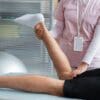Can a Cortisone Injection Cause Knee Pain? Here’s What You Need to Know
Knee pain is a common problem that affects millions of people worldwide. It can be caused by a variety of factors, including injury, arthritis, and overuse. One treatment option for knee pain is a cortisone injection, which is a type of steroid medication that is injected directly into the knee joint. While cortisone injections can be effective in reducing inflammation and pain, some people may experience knee pain after receiving the injection. In this article, we’ll explore whether a cortisone injection can cause knee pain and what you can do about it.
What is a Cortisone Injection?
A cortisone injection is a type of steroid medication that is injected directly into a joint, such as the knee. Cortisone is a powerful anti-inflammatory medication that can help reduce swelling and pain in the joint. It works by suppressing the immune system and reducing the production of inflammatory chemicals in the body. Cortisone injections are often used to treat conditions such as arthritis, bursitis, and tendonitis.
Can a Cortisone Injection Cause Knee Pain?
While cortisone injections can be effective in reducing knee pain, some people may experience knee pain after receiving the injection. This is because cortisone injections can cause a temporary increase in inflammation in the joint before the anti-inflammatory effects take hold. This temporary increase in inflammation can cause pain and discomfort in the knee. Additionally, some people may experience an allergic reaction to the cortisone medication, which can also cause knee pain.
What Can You Do About Knee Pain After a Cortisone Injection?
If you experience knee pain after a cortisone injection, there are several things you can do to manage the pain and discomfort. First, you can apply ice to the knee to help reduce swelling and inflammation. You can also take over-the-counter pain medications, such as acetaminophen or ibuprofen, to help manage the pain. It’s important to avoid strenuous activities that may aggravate the knee and to rest the knee as much as possible.
If the knee pain persists or becomes severe, you should contact your healthcare provider. They may recommend additional treatments, such as physical therapy or another type of medication. In some cases, a second cortisone injection may be necessary to provide additional pain relief.
Conclusion
While cortisone injections can be an effective treatment option for knee pain, they can also cause knee pain in some people. If you experience knee pain after a cortisone injection, it’s important to take steps to manage the pain and discomfort. Applying ice, taking over-the-counter pain medications, and resting the knee can all help. If the pain persists or becomes severe, contact your healthcare provider for additional treatment options. Remember, taking care of your knee health is important for achieving your fitness goals. If you’re looking for a comprehensive health and fitness solution, download the Fitpaa app today and start your journey towards a healthier, happier you.









